The meeting shows how the leaders seek to exploit any opportunity to ‘delegitimise the West’, experts tell The i Paper
Chinese leader Xi Jinping and his Russian and North Korean counterparts are exploiting an opportunity to “delegitimise the West”, experts have told The i Paper as they were given centre stage at a “carefully managed” parade to showcase Beijing’s military might.
The three leaders’ attendance at Wednesday’s parade marks their first ever public meeting together, to celebrate 80 years since the end of the Second World War and China’s conflict with Japan.
The occasion also marks North Korea’s Kim Jong-un‘s first multilateral visit. It is his first foreign trip since 2023 – when he travelled to Russia – and his third meeting with Russian President Vladimir Putin. The pair most recently met in Pyongyang in 2024, where they signed a mutual defence treaty.
Images from Beijing appeared to show Kim arriving in an armoured train, which travelled across the Chinese border. He travelled alongside his daughter, Kim Ju-ae, described by South Korea’s spy agency as his “most likely” successor.
The parade comes just days after Chinese leader Xi Jinping hosted more than 20 world leaders, including Putin and Indian Prime Minister Narendra Modi, for the largest-ever summit of the Shanghai Co-operation Organisation (SCO) in Tianjin, China.
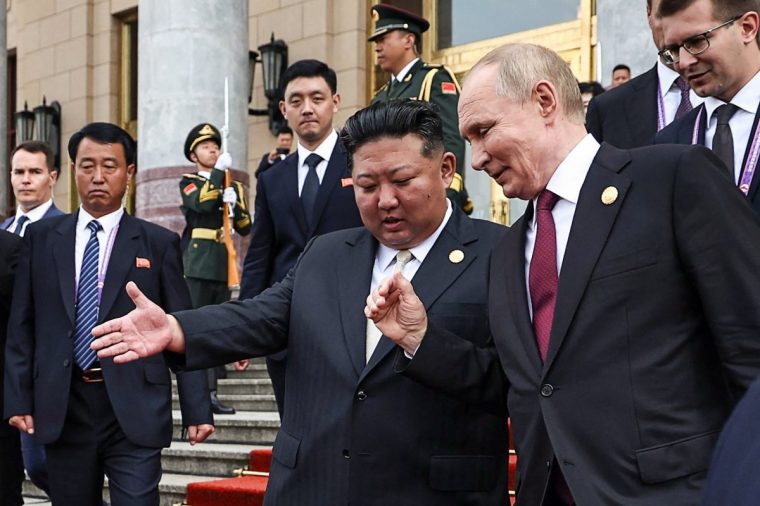
In a speech during the parade, Xi told assembled crowds in Tiananmen Square that China was “unstoppable”.
Putin used the summit – which aimed to challenge Western dominance on the world stage – to blame Nato expansion for Russia’s invasion of Ukraine and to hail his country’s “unprecedented” relationship with China.
Here, The i Paper takes a closer look at how the three-way alliance could impact international relations – and what threat it poses to the West.
What’s in it for Russia, China and North Korea?
The three-way meeting of Putin, Xi and Kim highlights “how all three leaders seek to exploit any opportunity to delegitimise the West – particularly the US [and] its allies”, Edward Howell, a lecturer in international relations at the University of Oxford, told The i Paper.
Apparently aware of their attempt to undermine the US-led world order, Trump posted on Truth Social yesterday: “Please give my warmest regards to Vladimir Putin and Kim Jong Un as you conspire against the United States of America.”
Professor Rex Li, a research affiliate of the Lau China Institute at King’s College London, said the visit had been “carefully staged”.
“The military parade is a demonstration of Chinese military power,” Li said. “It is a parade related to Japan’s defeat in the Second World War. As we know, Japan is a close ally of the United States.
“It’s meant to be sending a clear signal to the world – to the West and the United States in particular – that China is a military power that has to be taken very seriously.”
Beijing unveiled laser weapons, nuclear ballistic missiles and giant underwater drones at the massive military parade.
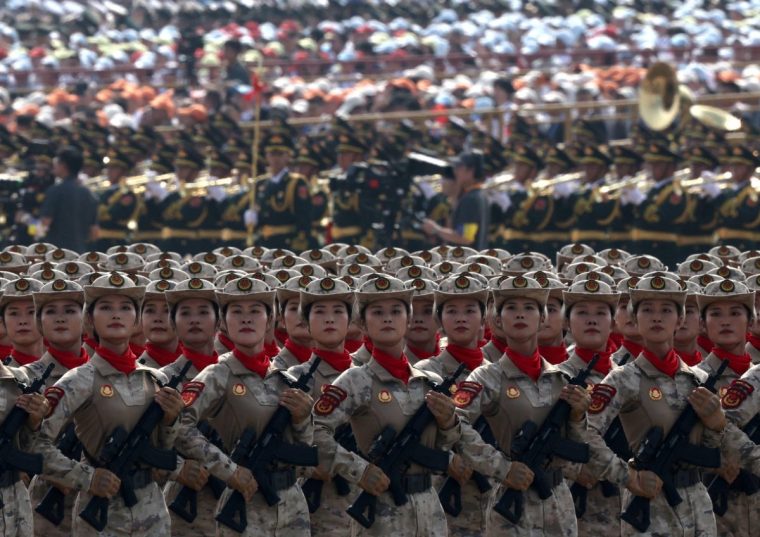
Turning to the broader objectives of the visit, he said it marks yet another example of Russia, China, North Korea and other non-Western countries seeking to “challenge the existing international order”.
“This is an example of an attempt to build an alternative world order to the West, especially to the United States,” he said.
The timing of the meeting is also vital, Li explained, pointing to the fact that it has taken place just weeks after Trump met Putin in Alaska to negotiate a ceasefire in Ukraine.
“It is already difficult for President Trump and other European leaders to pressure Putin to end the Ukraine war, so now that we can see that Russia clearly has Chinese backing, in a way it appears to be in a stronger position. It appears to have stronger bargaining power in negotiating with the US and Western countries.”
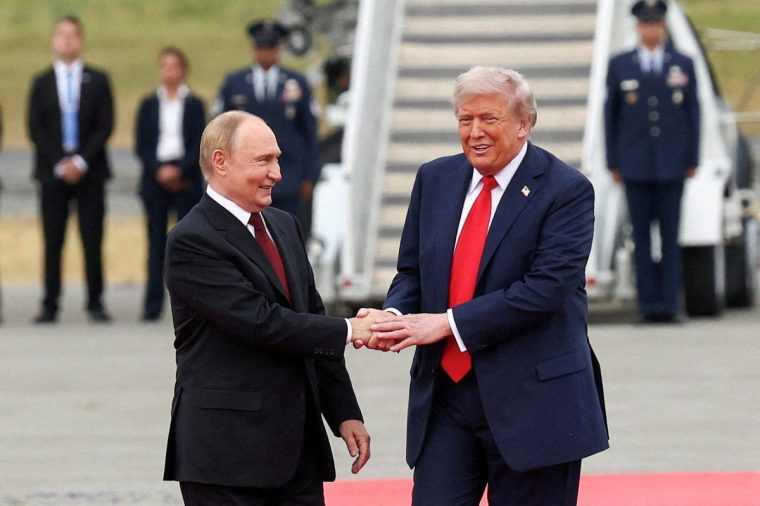
The meeting will also reinforce North Korea’s commitment to offer Russia military support, with the country already reportedly sending 12,000 troops to assist in the fight on the ground, according to Dr Howell.
During the bilateral, Kim told Putin he would be prepared “to do everything possible to help”, adding: “If there’s anything I can do for you and the people of Russia, if there is more that needs to be done, I will consider it as a fraternal duty, an obligation that we surely need to bear.”
Dr Howell said Kim’s intention for the meeting was to strengthen “existing ties with Russia and China” while also potentially viewing the “occasion as an opportunity to develop financial ties with other states, such as Iran, with whom it could earn money from selling weapons.”
“Putin gains the benefit of domestic legitimacy by being seen with Xi Jinping having reaffirmed the relationship between the two states at the SCO summit.
“Xi gains crucial leverage vis-à-vis the United States … by hosting the parade and bringing together the leaders of rogue states, not least North Korea, with whom Trump has explicitly said that he would be interested in renewing dialogue.”
The events come as the White House suggests Trump could be in the region at the end of October and is open to meeting Xi, added Dr Howell, who is also a Korea Foundation Fellow with the Asia-Pacific Programme at Chatham House.
Kerry Brown, professor of Chinese studies and director at the Lau China Institute at King’s College London, said that although the parade offers the three leaders a “unique opportunity to link together”, the stakes for each country are “very different, as is the way they define their key interests”.
She explained: “For China, its economy and its rise to global superpower status means it has the most to gain, or lose, by links. For Russia, sanctions because of the war on Ukraine mean links with China are an economic lifeline.
“For [North Korea], it has a unique opportunity to create deeper links with two far larger and more powerful countries, at a time when they are seeking space away from the US.”
Could Russia, China and North Korea build a formal military alliance?
While Putin, Xi and Kim’s attendance at the parade shows the “strengthening ties between the states united by their firm opposition to the US-led international order”, Dr Howell said that the formation of a three-way military alliance is unlikely.
He explained that an official military alliance could jeopardise China and Russia’s relationship with South Korea, put Beijing’s economic and diplomatic ties to the West at risk, and force all three nations into unwanted and costly military exercises.
“On the point about trilateral military exercises, if any such exercises were to take place… North Korea’s capabilities will pale in comparison to those of Russia and China,” Dr Howell said.
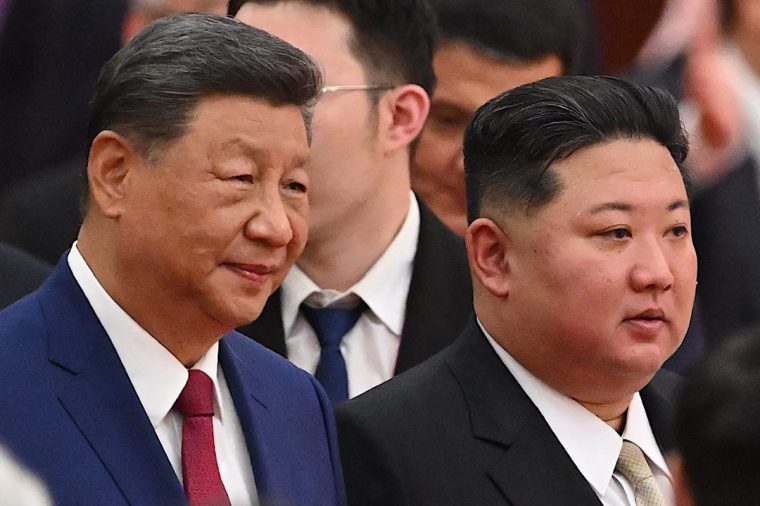
“Any improvements in military technology will not be cost-free, even despite Russia’s assistance in this regard. North Korea does not want any further financial burdens, since it would prefer to place more financial resources into fulfilling Kim Jong-un’s ultimate goal, namely, for North Korea to be recognised as a de facto nuclear-armed state.”
Turning to their relationship with South Korea, he stressed that China is South Korea’s largest trading partner and that trade relations between Seoul and Moscow were “burgeoning” before the full-scale invasion of Ukraine, with “Russia serving as a key supplier of coal, oil, and liquefied natural gas”.
“Beijing will also not want to strain its economic relations with the West,” Dr Howell said, “not least European states, which could emerge out of any formalisation of its ties with Moscow and Pyongyang”.
Brown agreed a military alliance was unlikely to materialise after the “unequal gathering”, adding: “They have vastly different militaries, and vastly different aims.
“For [North Korea] it is regime survival, for Russia some kind of success in the current war, but for China it is looking to create a role for itself in a new global order where it can preserve its interests while promoting the things that it needs from other countries.”
How could the West react to the tighter three-way relationship?
Professor Li said that Western leaders will “observe the trilateral partnership very closely, but they will respond carefully”.
He explained: “They don’t want to antagonise China, given that they have extensive trade and an economic relationship with the country, particularly in light of Trump’s harsh tariffs.”
Western countries could “try to persuade China” that closer military ties with North Korea and Russia could “undermine China’s relationship with the West”.
He added: “What the US might do is offer more support for Japan to strengthen its military capabilities… Greater military support could pave the way for Japan to develop its nuclear power. That could be a reaction.
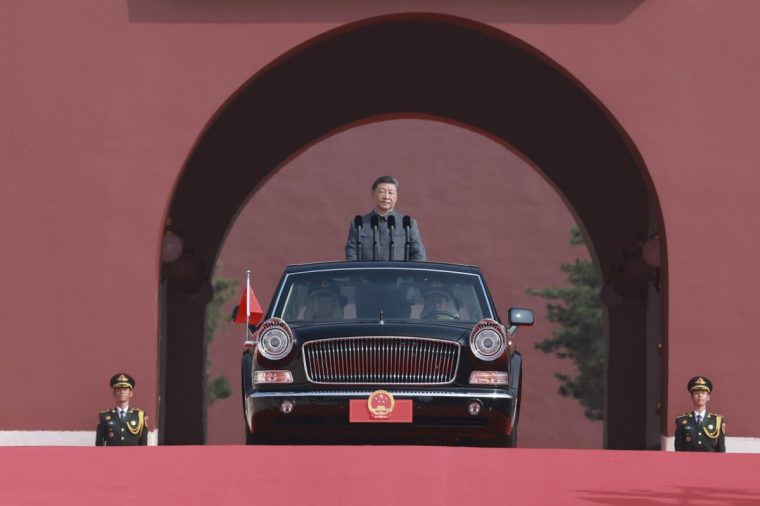
“The US could also strengthen its relationship with South Korea in the face of a belligerent North Korea.”
Jenny Town, director of the Korea programme at the 38 North think-tank, which specialises in North Korea, said the three-way meeting will also force Japan and South Korea to pressure the West to enhance its support for them.
She told The i Paper: “Certainly, any movement toward formal trilateral military co-operation or partnership among China, Russia and North Korea will have chilling effects in the region.
“It will make it more difficult to balance relations. The growing co-operation between Russia and North Korea, compounded by the antagonism from the US toward its allies, already has South Korea and Japan in particular pledging closer co-operation. That trend would likely be intensified the more China, Russia and North Korea lean into potential trilateral co-operation.”
